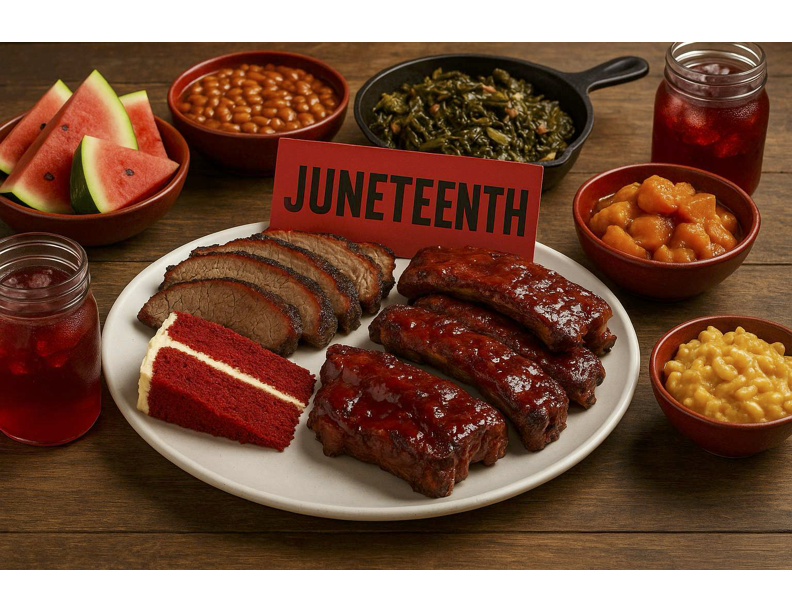Juneteenth isn’t just a date in history—it’s a celebration of freedom, culture, and survival. On June 19, 1865, enslaved African Americans in Galveston, Texas were finally told they were free—two and a half years after the Emancipation Proclamation. That moment turned into an annual celebration of liberation and Black culture. Today, Juneteenth is a federal holiday, but for generations it was kept alive in backyards, church lots, and community parks with one key ingredient: food.
American cuisine can’t be separated from the legacy of Black Americans. From soul food to barbecue, from gumbo to okra, African and African American culinary traditions built the backbone of what we call “American food.” Juneteenth is a day to celebrate that impact—and to understand where it came from.
Red Foods: A Symbol of Resistance
On Juneteenth, red is more than a color—it’s a symbol. Red drinks like hibiscus tea, strawberry soda, or Big Red, and red foods like red velvet cake, hot links, and watermelon often show up at the table. The color is rooted in West African traditions, where red symbolizes life, strength, and spirituality. It also represents the blood shed by enslaved people in the fight for freedom.
These red foods aren’t just about taste—they’re about memory. They connect the past to the present, anchoring the celebration in a legacy of resistance and joy.
From Survival to Celebration
Much of what we now call Southern cuisine came from enslaved Africans. They were given the scraps—collard greens, pork fat, cornmeal—and turned them into staples. Dishes like fried chicken, black-eyed peas, cornbread, and candied yams weren’t just survival food. They became symbols of creativity, perseverance, and home.
On Juneteenth, those dishes take center stage. Not as relics, but as living traditions. Passed down through generations, tweaked and refined, they remind us that culture lives in the kitchen.
A Table of Innovation
Black chefs and cooks haven’t just preserved tradition—they’ve expanded it. From Edna Lewis to Marcus Samuelsson, from Sylvia Woods to Rodney Scott, Black culinary leaders have helped define and redefine American food. Juneteenth is a moment to honor that innovation. It’s a time to recognize that American cuisine wouldn’t exist without African American hands.
Why It Matters
Celebrating Juneteenth through food isn’t about nostalgia—it’s about recognition. It’s about giving credit where it’s long overdue. It’s about acknowledging that every bite of American cuisine has a history—and often, that history is rooted in struggle, strength, and genius.
So whether you're grilling ribs, sipping a red drink, or just learning about the holiday for the first time, remember: Juneteenth is about freedom. And the food we eat is one of the most powerful ways we remember how far we’ve come—and how much farther we still need to go.

